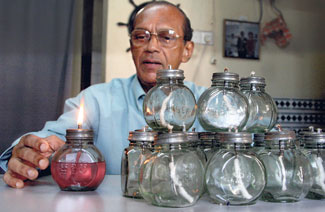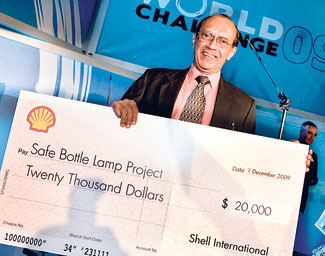It was the second triumph for Sri Lanka at this prestigious global competition. Seated in the front row in the auditorium at the Hague in the Netherlands on December 1 as one of the three finalists of the ‘World Challenge – 09’ conducted by Shell, BBC and Newsweek magazine, a tiny flame of hope flickered in Dr. Wijaya Godakumbura that his ‘Safe Bottle Lamp Project’ could win this prestigious competition. All too aware of the tension and suspense of the final few minutes, he was overjoyed to hear his project being announced as the winner.
The Safe Bottle Lamp project founded by Dr. Godakumbura, a Consultant Surgeon, to prevent deaths caused from burn injuries, beat stiff competition from Indonesia (first runner up) and USA (second runner up), UK, India, Thailand, Israel among others. The Sunday Times highlighted the project making it to the final 12 in an article titled “Global Glow” published on October 25 and Dr. Godakumbura had a big ‘thank you’ for all those who voted online.
 |
| Shedding light beyond Sri Lanka: Dr. Godakumbura with his ‘Sudeepa lamps’ and (below) receiving his Prize money at the Hague on December 1. |
 |
“This is the only project concerning human suffering while others were on environment related issues.
This would probably have been a reason for the victory. Initially, when we were shortlisted as one of the 12 finalists selected from about 1000 entries, I had doubts because though the project was good, the final victory depended on public voting, especially considering the fact that our population is fairly small compared to other countries.
However, when I was invited for the final ceremony in the Hague to announce the winner as we were among the first three, I thought the project had a fairly good chance of winning,” he says.
The prize money of US$ 20, 000 would be utilised to make another 50,000 safe bottle lamps, says Dr. Godakumbura, adding that the people in the north would be a target group this time. Since the project was started in 1992, about 750,000 safe bottle lamps have been manufactured and distributed in all parts of the island except in the north.
The project is now likely to reach beyond Sri Lanka’s shores, as thanks to the global reach of the World Challenge competition, other countries too have realised its value to society. “Unsafe lamps are used in several developing countries too. After we became one of the 12 finalists in World Challenge, some NGOs in Africa, Bangladesh and Indonesia have sought our permission to make lamps to our design.
We are indeed happy to allow that. Now that we have established our capability and credibility and with global recognition, we expect more support than before from individuals and organizations,” Dr. Godakumbura says.
In 2006, another Sri Lankan firm Maximus, which makes paper from elephant dung won the World Challenge. With 35 employees, Maximus recently launched a 'Peace Paper' scheme to help villagers earn money from collecting dung from wild elephants.
The Safe Bottle Lamp project came about when Dr. Godakumbura, then a junior doctor at a government hospital, saw firsthand the misery caused by injuries from kerosene bottle lamp accidents. After becoming a surgeon he came into close contact with patients who were victims of such accidents. In 1992, he was deeply moved by the tragic death of a 19-year-old girl who was brought to the Ratnapura Hospital with severe burn injuries. Realising the urgent need to find a safe alternative to prevent such kerosene lamp injuries, Dr. Godakumbura decided he needed to take some action.
“The extent of the problem depends on the availability of electricity in houses, especially in rural areas and slums. At that time there were about 400 burn deaths a year of which one third were caused due to unsafe bottle lamps,” he says. He observed the defects in the makeshift kerosene bottle lamps which were tall and narrow and hence tended to tip over easily and designed the safe alternative ‘Sudeepa’ which is short and heavy, made of thick glass with two flat sides to prevent it from rolling if it topples. The lid which was tightly screwed on prevented any spillage of kerosene. This lamp was approved by the Sri Lanka Medical Association and National Committee for Prevention of Injuries.
The project grew over the years. For the first six years, Dr. Godakumbura worked single-handed to get the message to the public, but as awareness grew, so did the support for his initiative. “We got support from various organisations and individuals. I got in touch with private organisations for distribution of these lamps through their branches. We visited the villages – created awareness among people by way of radio/TV talks. There was a good response from the public to the lamp,” he says.
In 1998, the project won the prestigious Rolex award and Dr. Godakumbura established the Safe Bottle Lamp Foundation as an NGO with just two employees to help him. From 2006 onwards, the foundation has been receiving a regular annual grant of Rs. 500,000 from the Health Ministry which is a major source of financing the project. Yet, through it all, it has been a continuing effort to keep reaching those at risk. “Obstacles do came our way; but I took all that as a challenge,” he says philosophically.
Thankfully there has been a decline in the number of kerosene bottle lamp injuries in recent years, as a result of their campaign. The availability of electricity, safe bottle lamps and growing awareness among people on the use of bottle lamps have all contributed, he feels, adding that the safe bottle lamp, Sudeepa, should be made available in the market for people to purchase easily. “If there are no mosquitoes there will be no dengue or malaria; similarly there will be no burn injuries or deaths if there are safe kerosene lamps in the market,” he stresses.
State support to ban the use of unsafe lamps and promote the safe alternative is a vital need, he concludes. |


